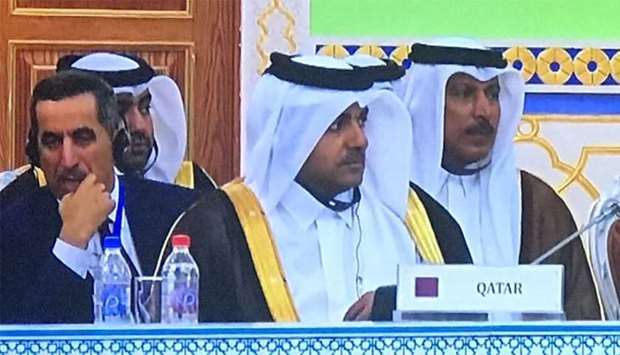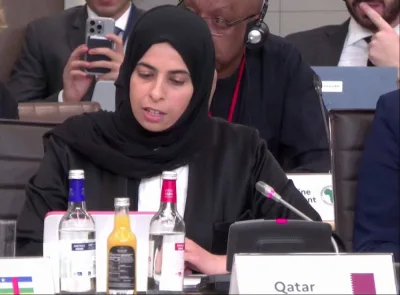The unjust blockade imposed on Qatar by the Saudi-led quartet has not prevented it from playing an active role in maintaining regional and international peace and security and combating terrorism and extremism in all their forms and manifestations, Special Envoy of the Minister of Foreign Affairs for Combating Terrorism and Mediation in Conflict Resolution, Dr Mutlaq bin Majed al-Qahtani, has said.
Addressing the concluding session of the high-level International Conference on Countering Terrorism and Preventing Violent Extremism in the Tajik capital of Dushanbe on Saturday, al-Qahtani reminded the participants that Qatar is under an unjust blockade that violated all values, international law, and international and humanitarian norms and obligations.
Saudi Arabia, the United Arab Emirates, Bahrain and Egypt cut diplomatic and transport ties with Qatar on June 5, accusing it of backing terrorism, a charge which Doha denies.
The International Conference on Countering Terrorism and Preventing Violent Extremism was organised by Qatar and Tajikistan in co-operation with the United Nations, the Organisation for Security and Co-operation in Europe and the European Union, in the presence of the Minister for Foreign Affairs of Tajikistan Sirodjidin Aslov.
Al-Qahtani said that the fight against terrorism and extremism was and will remain a top priority for Qatar. He reiterated Qatar's commitment to co-operate with all countries, international and regional organisations, and with various United Nations bodies related to combating terrorism and violent extremism.
He added that the financial, technical and logistical contributions made by Qatar in this regard are an affirmation of its conviction of combating terrorism, its financing and preventing violent extremism in all its forms.
He reminded the participants that member-states of the United Nations adopted in September 2006 a global counter-terrorism strategy as a unique instrument for strengthening national, regional and international efforts to combat the scourge.
Al-Qahtani added this was the first time that all member-states agreed on a unified strategy to combating terrorism.
He noted that since the adoption of the United Nations strategy, Qatar has been keen to fully implement it because of the important measures it has taken in accordance with its four pillars.
The first and foremost focused on the need to address the conditions conducive to the spread of terrorism, including but not limited to conflicts, wars and the absence of sovereignty, human rights violations, discrimination based on ethnicity, national and religious affiliation, political exclusion, social and economic marginalisation, lack of good governance and unemployment, and measures to ensure respect for human rights for all and the rule of law and respect for states of their obligations under international law in the fight against terrorism as a fundamental pillar in the fight against terrorism.
He stressed that terrorism and extremism are one of the most serious challenges facing the international community today, requiring co-operation of all regional and international efforts to address this phenomenon and terrorist organisations and their extremist ideologies. He stressed the need for measures to ensure that the concept of terrorism is not politicised and exploited by some governments to achieve political gains and legitimise their behaviour towards their people and other countries.
He pointed out that Qatar, through its active role in the fight against terrorism and extremism, has been able to create a million jobs for Arab youth at least 16 Arab countries with the help of its institutions. Qatar has also helped enable them economically to escape from the clutches of extremism and terrorism.
He noted that Qatar aims to create more than 2mn job opportunities for these young people by 2020.
Other State institutions have also been able to enroll 10mn children around the world in primary education in co-operation with relevant international, regional and national bodies in the belief that unemployment and illiteracy are one of the main reasons driving terrorism and violent extremism.
He pointed out that Qatar is one of the founding members, the main actors and supporters of Global Community Engagement and Resilience Fund (GCERF). It is also the only Gulf and Arab state to contribute to this fund, along with Switzerland, the US, the European Union, Japan, the UK, Canada, Australia and New Zealand, Netherlands and France.
He added that the fund is the first global initiative to support the resilience of societies against violent extremist agendas, working by linking security and development, and is committed to supporting national strategies to address the local factors of violent extremism.
The fund is currently active in Mali, Kenya, Nigeria, Bangladesh, Kosovo and Myanmar and other States are being included as beneficiaries of the Fund and its programmes.
He also noted that Qatar is an active member of the Global Counter-Terrorism Forum (GCTF), a 29-nation forum in addition to the European Union, which was established in 2011 to reduce the impact of terrorism and violent extremism on people around the world by preventing, combating and prosecuting terrorists.
Al-Qahtani that Qatar is an active member of the International Coalition Against ISIS, and contributed significantly to the war on this organisation in both Syria and Iraq with its partners and strategic allies, led by the US.
He pointed out that Qatar has made great efforts in the peaceful settlement of disputes through preventive diplomacy, and mediation as part of its goals and obligations in accordance with the Charter of the United Nations and the rules of international legitimacy which call for constructive cooperation among States, mutual respect, non-interference in internal affairs, and promotion peaceful coexistence and dialogue among all religions and civilizations.



